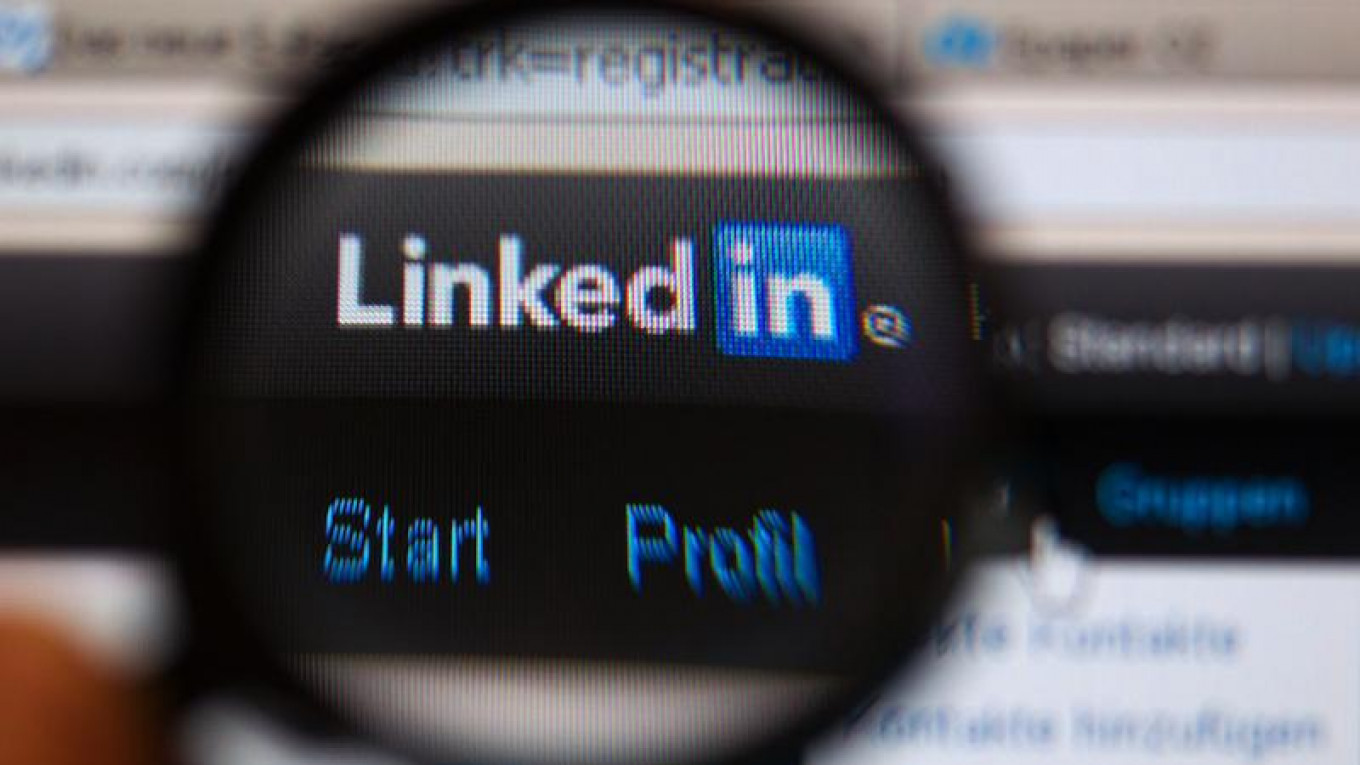In China, LinkedIn was the only major social network not banned by the Chinese government. The company’s management agreed to play by the rules and censor politically objectionable content. Ironically, in Russia, LinkedIn may be the first social network to be banned by Kremlin media watchdog Roskomnadzor for not playing by the rules.
That’s what will happen on Nov. 10 if a Moscow city court sides with Roskomnadzor and upholds a lower court’s decision to block the social networking site. LinkedIn stands accused of failing to comply with a 2014 federal law requiring internet companies that process Russian citizens’ personal information to store their user data on servers located in Russia.
Roskomnadzor’s move on LinkedIn came as a surprise for one simple reason: Many sites gather, process, and share Russian citizens’ user data. But no one — not Facebook, nor Twitter, nor WhatsApp — actually complies with the 2014 law, and many analysts consider it unenforceable.
The media watchdog explained its targeting of LinkedIn as a response to the company’s history of security problems. The site is infamous for a massive 2012 hack in which 6.4 million usernames and passwords were stolen.
“They have a bad track record: Every year there’s a major scandal about the safety of user data,” Roskomnadzor representative Vadim Ampelonsky told The Moscow Times.
But many analysts argue the case is, for all intents and purposes, a show trial intended to demonstrate that the previously untested 2014 law will be enforced. Many have suggested that law was implemented as a response to the 2011-2012 Moscow street protests, in which communication over social networks played a major role. Roskomnadzor wants greater control over these sites, but, so far, hasn’t been able to put the new law to work.
“You can’t be a regulatory agency if you don’t regulate,” says Andrei Konyaev, editor of the popular science website N+1. “This is intended for internal consumption to show that they are working.”
Leonid Volkov, head of the Internet Defense Society NGO, suggests Roskomnadzor, which holds regular meetings with companies like Facebook and Twitter, is trying to improve its negotiating position on data localization.
“They want to show [other companies] that they can block someone,” Volkov says. “But they won’t ever be able to block Facebook.”
Both analysts agree that LinkedIn was chosen for its “second tier” status. As of 2015, only 5 million registered LinkedIn users, out of a total of 400 million, came from Russia.
“If you block WhatsApp, there will be protests in the streets. You can’t do that before an election,” says Volkov. “LinkedIn isn’t popular and it hasn’t caught on [in Russia], but it’s important internationally.”
The move on LinkedIn may also stem from the company’s weak relations with Roskomnadzor. According to representative Ampelonsky, his agency meets with Facebook and Twitter at least twice a year to discuss a wide variety of issues. The steps that these companies are taking satisfy Roskomnadzor, and the agency is not planning sanctions against the companies, he says.
LinkedIn, on the other hand, does not have a representative in Moscow and did not provide Roskomnadzor with information about localizing user data in Russia, despite responding to two letters from the agency, Ampelonsky said.
However, in a formal statement to The Moscow Times, LinkedIn said it had “been in touch” with Roskomnadzor about data localization, but had “not been granted a time to meet.”
Regardless of the reasons for Roskomnadzor’s move, analysts believe LinkedIn will most probably be blocked. But the media watchdog’s next steps are still unclear.
In a Facebook post, rights activist Pavel Chikov outlined a “worst case scenario” in which the ban on LinkedIn would serve as the first step in a Russia’s gradual exit from the global internet. Konyaev suggests that Roskomnadzor might also target other “second tier” social networking sites.
Volkov believes the attack on LinkedIn is intended to push major players like Facebook to negotiate. But since Roskomnadzor will never be able to deliver on this veiled threat to block Facebook, he says the case’s meaning for other companies is clear: “Nothing.”
A Message from The Moscow Times:
Dear readers,
We are facing unprecedented challenges. Russia's Prosecutor General's Office has designated The Moscow Times as an "undesirable" organization, criminalizing our work and putting our staff at risk of prosecution. This follows our earlier unjust labeling as a "foreign agent."
These actions are direct attempts to silence independent journalism in Russia. The authorities claim our work "discredits the decisions of the Russian leadership." We see things differently: we strive to provide accurate, unbiased reporting on Russia.
We, the journalists of The Moscow Times, refuse to be silenced. But to continue our work, we need your help.
Your support, no matter how small, makes a world of difference. If you can, please support us monthly starting from just $2. It's quick to set up, and every contribution makes a significant impact.
By supporting The Moscow Times, you're defending open, independent journalism in the face of repression. Thank you for standing with us.
Remind me later.






